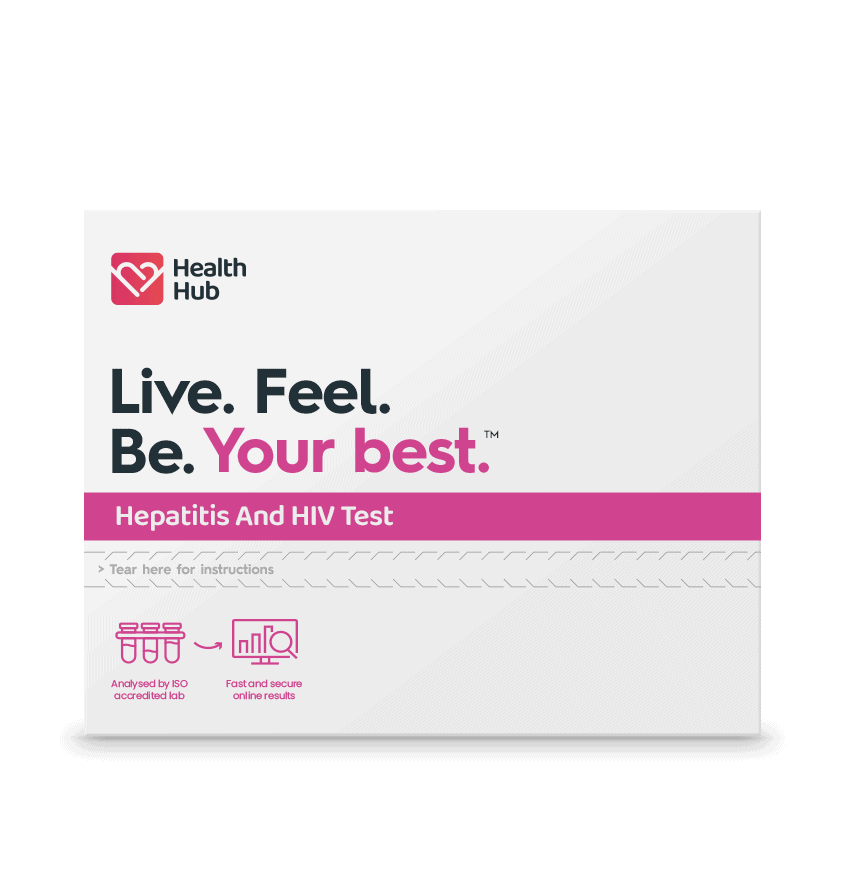Hepatitis And HIV Test
This simple to use and painless test, tests for Hepatitis B, Hepatitis C and HIV. Fast confidential results with discreet packaging.
- Free shipping
- A doctor validated report
- Fast results from sample receipt at lab
- 7-days per week customer care
Collection method:
£84.99
Out of stock
Want to be notified when this product is back in stock?
• Blood collection device using finger-prick method
• Tracked 24 return mailing bag
• A doctor validated report
• 3-5 working days turnaround from sample receipt at lab
Order by 3pm weekdays and your test will be the dispatched the same day (excluding bank holidays). Royal Mail tracked 24 shipping is provided free of charge. You will be emailed your tracking number.
DNA testing via Fingerprick blood testing for:
Hepatitis B and C
Human immunodeficiency virus (HIV)
Hepatitis B is an infection of the liver caused by a virus that’s spread through blood and body fluids
Many people with hepatitis B will not experience any symptoms and may fight off the virus without realising they had it. Chronic hepatitis B infection often requires long-term or lifelong treatment and regular monitoring to check for any further liver problems.
Hepatitis C is another hepatitis virus that can infect the liver. If left untreated, it can sometimes cause serious and potentially life-threatening damage to the liver over many years. But with modern treatments, it’s usually possible to cure the infection, and most people with it will have a normal life expectancy.
HIV (Human Immunodeficiency Virus) is a virus that attacks the body’s immune system. If HIV is not treated, it can lead to AIDS (acquired immunodeficiency syndrome). While AIDS cannot be transmitted from one person to another, the HIV virus can. There’s currently no cure for HIV, but with early diagnosis and effective treatments, most people with HIV will not develop any AIDS-related illnesses and will live a near-normal healthy lifespan.
This test looks for the presence of Human Immunodeficiency Virus (HIV) 1 and 2 antibodies (that suggest an established infection with HIV), and also for antibodies to a part of the virus particle known as p24, high levels of which are present in the blood serum of newly infected individuals before seroconversion.
As HIV remains a provocative diagnosis, you will have the choice to opt out of having your HIV status checked. If you want the HIV test, you will need to sign to say you have read through the pre-counselling leaflet and understand the sequelae of a positive result.
If your first test suggests you have HIV, you will need to contact your local Sexual Health Clinic for a further blood test to confirm the result.
This is a sensitive test, and because of this, in a minority of cases, a false positive result is possible, that is being told you are positive for HIV, when in fact you are not. A further confirmatory test therefore is required to confirm if the HIV virus can be detected in the system and only with 2 positive tests would you given a diagnosis of HIV.
You should contact your local Sexual Health Clinic for this further blood test to confirm the result.
However, there is also a small possibility of a false negative result as well, that is a person infected with HIV is
given a negative result. This is extremely possible if the test was taken before the window period has passed,
which is usually 4 weeks from the time of exposure but can be up to 12 weeks
For questions about HIV and support call: NHS Sexual Helpline 0300 123 7123
Window Period
STIs may not show up on tests straight away after sex – this delay is known as the ‘window period’. If you think you may have been at risk of infection, it’s advised you wait 2 weeks after potential exposure before providing a sample for testing for Chlamydia and Gonorrhoea, and a month for Trichomonas.
For HIV, Hepatitis and Syphilis, the window period can be up to 3 months, sometimes longer. If you are concerned that you may have been exposed to a STI, but your results are negative, it may be worth considering repeating your test making sure the window period or that STI has been well and truly passed.
Positive results
If any of your results are positive you will be asked to contact your local sexual health clinic as not only will your STI need treatment, but the sexual health clinic will want to undergo Contact Tracing – in other words discuss with you about contacting any of your previous sexual contacts as they will also need investigating and possible treatment.
Negative results, but continued concerning symptoms
Should you tests with us all come back as negative, but you are continuing to suffer from STI like symptoms, you should contact your local Sexual health Clinic to get tested again.
To find your local Sexual Health Clinic please click HERE
Hepatitis B
Hepatitis C
HIV
